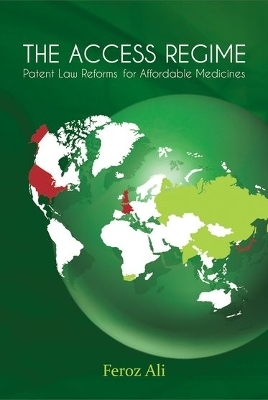
The Access Regime
Patent Law Reforms for Affordable Medicines
Seiten
2015
OUP India (Verlag)
978-0-19-946348-0 (ISBN)
OUP India (Verlag)
978-0-19-946348-0 (ISBN)
India's post-TRIPS (Trade Related Aspects of Intellectual Property Rights) patent law reforms, which incorporates a remarkable array of flexibilities, is seen as a counter-harmonization measure in direct opposition to the dominant model of patent law pioneered by the United States. India's response, which represents an alternative model of confirming to the TRIPS Agreement, has seen stiff resistance in the form of counter-provisions in Free Trade Agreements entered by the United States and other countries. Historically, patent systems based on neoliberalism, like the American model, favour individual pursuits whereas patent systems based on social democracy, like the Indian model, focus on community goals. This distinction manifests in the manner in which the role of the public is defined in the patent system.
India's model is characterized by the emphasis on the public elements in three significant ways. First, in redefining pre-grant opposition by allowing public participation in questioning the ex ante validity of patents. Second, in protecting the public domain by heightening the standard of patentability and requiring the patent applicant to demonstrate technical advance and greater effectiveness of the invention. Third, in providing for compulsory licensing when the public interest is affected by a patent that is not worked locally. The influence of the India's model has come from mimicry by other countries in following the Indian example. Countries like Argentina, Philippines, Brazil, China and South Africa have either emulated or strongly favour following India's path. Such state practices might occasion the re-imagination of the TRIPS Agreement as the Access Regime.
This book explains why India took that unique route in patent law, details the provisions made the Indian patent law unique, and charters the course for countries awaiting to follow the Indian example.
India's model is characterized by the emphasis on the public elements in three significant ways. First, in redefining pre-grant opposition by allowing public participation in questioning the ex ante validity of patents. Second, in protecting the public domain by heightening the standard of patentability and requiring the patent applicant to demonstrate technical advance and greater effectiveness of the invention. Third, in providing for compulsory licensing when the public interest is affected by a patent that is not worked locally. The influence of the India's model has come from mimicry by other countries in following the Indian example. Countries like Argentina, Philippines, Brazil, China and South Africa have either emulated or strongly favour following India's path. Such state practices might occasion the re-imagination of the TRIPS Agreement as the Access Regime.
This book explains why India took that unique route in patent law, details the provisions made the Indian patent law unique, and charters the course for countries awaiting to follow the Indian example.
Feroz Ali is a Ministry of Human Resource Development Intellectual Property Rights Chair at the Indian Institute of Technology Madras
Preface ; Acknowledgment ; Introduction ; PART 1: THE PUBLIC IN PATENT LAW ; 1. Patent System, Constitution and the Public ; 2. The Resurgence of the Public ; PART 2: HOW INDIA REINSTATED THE PUBLIC IN PATENT LAW ; 3. Pre-grant Opposition: Ex Ante Validation of Patents ; 4. Heightened Standards of Patentability: Raising the Bar on Inventions ; 5. Compulsory Licensing: Local Working in Global Economy ; PART 3: REIMAGINING THE TRIPS AS AN ACCESS REGIME ; 6. The Fault Lines of Harmonization ; 7. The Access Regime: Reimagining the TRIPS Agreement ; Bibliography ; Index
| Verlagsort | New Delhi |
|---|---|
| Sprache | englisch |
| Maße | 148 x 222 mm |
| Gewicht | 478 g |
| Themenwelt | Medizin / Pharmazie ► Gesundheitswesen |
| Medizin / Pharmazie ► Medizinische Fachgebiete ► Medizinethik | |
| Studium ► Querschnittsbereiche ► Geschichte / Ethik der Medizin | |
| Recht / Steuern ► Allgemeines / Lexika | |
| Recht / Steuern ► EU / Internationales Recht | |
| ISBN-10 | 0-19-946348-4 / 0199463484 |
| ISBN-13 | 978-0-19-946348-0 / 9780199463480 |
| Zustand | Neuware |
| Haben Sie eine Frage zum Produkt? |
Mehr entdecken
aus dem Bereich
aus dem Bereich
Die Geschichte eines Weltzentrums der Medizin von 1710 bis zur …
Buch | Softcover (2021)
Lehmanns Media (Verlag)
17,95 €
von der Antike bis zur Gegenwart
Buch | Softcover (2024)
C.H.Beck (Verlag)
12,00 €
Krankheitslehren, Irrwege, Behandlungsformen
Buch | Softcover (2024)
C.H.Beck (Verlag)
39,95 €


